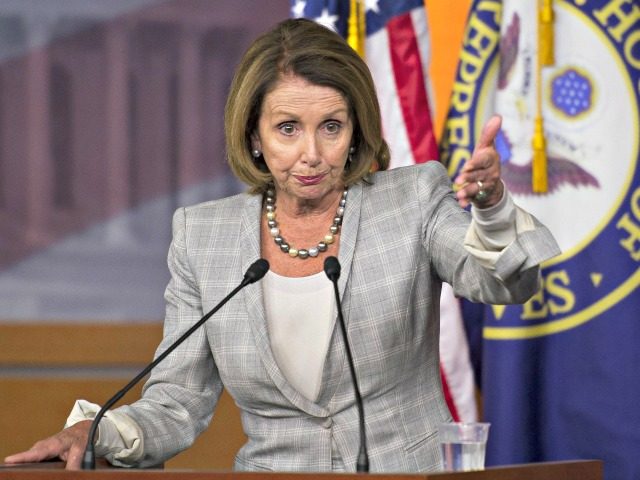A national political correspondent for The Washington Post tweeted out Saturday that Democratic Minority Leader Nancy Pelosi (D.-Calif.) has weak support from members in her own caucus.
“Striking finding from weekend of interviews with swing district Democratic House candidates: None would commit to back Pelosi for speaker,” tweeted David Weigel, who is traveling to cover the 2016 election cycle.
The Weigel tweet comes on the heels of a report from the San Francisco Chronicle report Friday quoting a spokesman for the Republican National Committee saying that Pelosi is the new target for the GOP in its battle to save its House majority.
A spokesman for the National Republican Campaign Committee suggested that anti-Pelosi ads could start popping up in competitive districts around the country, including in California’s San Joaquin Valley, where Pelosi is deeply unpopular and where GOP incumbents Jeff Denham of Turlock (Stanislaus County) and David Valadao of Hanford (Kings County) are running for re-election in heavily Latino districts.
Meanwhile, Democrats are targeting suburban districts where Trump is trailing badly among college-educated voters and women, threatening to drag down otherwise safe GOP incumbents. Among the most prominent is Rep. Darrell Issa’s suburban San Diego seat, where the wealthy, nationally known, eight-term Republican faces a surprisingly strong challenge from Doug Applegate, a Democrat making his first run for office.
In the decade since Pelosi became the first female Speaker of the House Jan. 4, 2007, when she was the choice of 233 Democrats with 202 Republicans voting for Republican leader John A. Boehner (R.-Ohio), her support among Democrats has weakened.
Pelosi taking the gavel was the harvest of the Democrats retaking control of the House for the first time since Speaker Newt Gingrich ended four decades of Democratic control with his 1994 Contract with America and 1995 election to speaker. In a real way, the Democrats’ taking of the House was a harbinger of their party’s victory in 2008, when they also took the Senate and the White House with President Barack Obama.
Pelosi’s 2009 election for speaker was a bigger win, with the daughter and sister of Baltimore mayors garnering 255 votes against Boehner’s 174.
The 2010 midterms were tough on Democrats. They lost control of the House and lost seats in the Senate. It was also tougher for Pelosi as she went up against Boehner, this time with the minority.
Although the election for speaker is nearly always a forgone conclusion, there is the twist that the speaker must win with a minimum of 218, not a plurality. This rule means there is great pressure on House members to vote with their party, lest they create a situation, where they lose the speakership. For the minority party, the vote for speaker is their show of strength as the session of Congress opens.
In the 2011 vote for speaker, Boehner beat Pelosi 242-to-173, but serious cracks in Democratic unity were exposed in the wake of the Democrats’ 64-seat loss amidst the Tea Party revolution. Eleven Democrats voted for Rep. Heath Shuler (D.-N.C.), the former starting quarterback for the Washington Redskins. Another seven votes went to six other candidates.
In the 2013 speaker election, there was turmoil on the Republican side, too. Boehner beat Pelosi 220-to-192, with Boehner collecting only two votes more than he needed to keep his gavel, although his conference had 234 members. The turmoil in the GOP House Conference would not go away until it led to Boehner’s resignation in the next session and the ascension of Speaker Paul D. Ryan (R.-Wis.).
The 2014 midterm was another disaster for the Democrats. They lost another 13 seats, giving the GOP at 247 seats its largest majority since 1929.
During the 2014 campaign, Rep. Stephen F. Lynch (D.-Mass.) and Rep. Michael E. Capuano (D.-Mass.) told Jim Braude, the host of Boston’s WGBH-TV’s Greater Boston program that Pelosi was part of the problem for House Democrats.
When Pelosi took over the House in 2007, Capuano was the leader of her transition team, so when the former mayor of the working-class city of Somerville said he was distressed at the loss of Democratic House seats, Pelosi had to have noticed.
“If it is not working, you should change what you are doing,” he said. “I think we need leadership that understands that if something you are doing isn’t working you should change what you are doing.”
Braude pressed Capuano: “So, she should go?”
Capuano: “Either that or she should change, one way or the other.”
Sitting next to Capuano on the set, Lynch did not hedge.
Braude to Lynch: “Should she go?”
Lynch: “Nancy Pelosi will not lead us back into majority,” said the congressman from South Boston, who also voted against the 2010 Patient Protection and Affordable Care Act.
Braude: “So, the answer is yes?”
Lynch: “Right.”
In the 2015 election for speaker, Pelosi received only 164 votes out of the 188 members in her caucus. Out of the 20 Democrats who did not vote, 12 were congressmen from New York State. Both Lynch and Capuno voted for Pelosi.

COMMENTS
Please let us know if you're having issues with commenting.